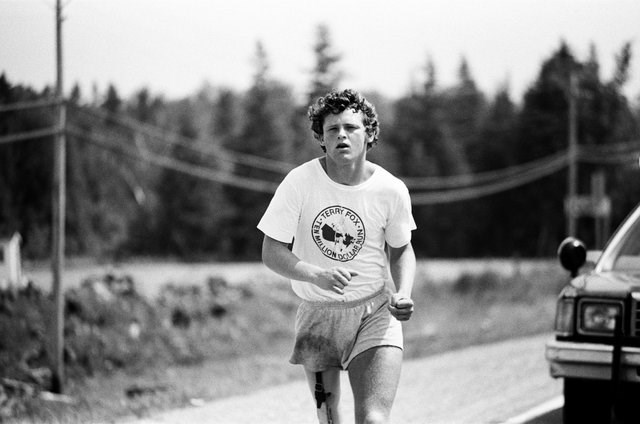
Looking back 45 years after the famed Canadian dipped his artificial leg in the Atlantic Ocean on April 12, 1980, oncologist Dr. André Veillette says he can see the impact Terry Fox had on him personally, and also, on waking the public’s consciousness to how little was known about cancer. Terry Fox is shown in this handout photo provided by the Terry Fox Foundation.
Image Credit: THE CANADIAN PRESS/HO-Terry Fox Foundation *MANDATORY CREDIT *
April 11, 2025 - 9:00 PM
Dr. André Veillette was in medical school when he watched updates on Terry Fox's cross-country run on the evening news. He didn’t realize the impact the 21-year-old, just a year older than he was at the time, would have on his life.
Veillette went on to become an oncologist, director of a molecular oncology research unit in Montreal and the executive director of the Marathon of Hope Cancer Centres Network, named after Fox's campaign to raise money for cancer research.
Looking back 45 years after the famed Canadian dipped his artificial leg in the Atlantic Ocean on April 12, 1980, Veillette says he can see the impact Fox had on him, and also, on waking the public’s consciousness to how little was known about cancer.
But Veillette says it took years for breakthroughs that would change cancer treatment. Those findings resuscitated the significance of cancer research, but it also emphasized just how much is still unknown about the disease.
Terry Fox’s older brother Fred Fox still visits more than 100 schools a year to drive that message home. Terry Fox raised about $24 million by 1981. Since then, the Terry Fox Foundation says it has raised more than $950 million, funding more than 1,300 cancer research projects. This week it launched a cancer breakthrough fund in partnership with a venture capital firm aiming to pair startups developing cancer therapies with investors.
Fred Fox says he often gets asked at schools why his brother's legacy carved such a profound place in Canadians’ hearts.
“I think it's because Terry never gets older,” Fred Fox, who is 14 months older than Terry, said. His younger brother would have turned 67 in July. “But he's still a 21, 22-year-old kid that was running across Canada that I think young students and children across the country can relate to.”
When his brother set out on his run, cancer research was rudimentary, a reality Terry Fox became aware of while undergoing 16 months of chemotherapy after he was diagnosed with osteogenic sarcoma at age 18, and his right leg was amputated 15 centimetres above the knee.
“But seeing so many others, younger and older, going through the same things ... learning that they've passed away, it impacted Terry like nothing else had ever impacted him,” Fred Fox said.
The limited treatment options available to patients at the time was also on Veillette’s mind while working as an oncologist in Montreal in the 1990s. He decided to stop seeing patients and pivot to cancer research. He says there's been two major advancements that have revolutionized the field.
After decades of slow progress, American researchers turned a corner in uncovering the first human oncogene, a mutated gene that can cause a normal cell to turn cancerous, in the early '80s, shifting the understanding of how tumours develop. But it wasn't until the early 2000s that these developments translated to more targeted therapies.
He says the second major finding was that the immune system of cancer patients was failing them, essentially falling asleep. “And as a result, cancer cells, which are normally controlled by the immune system, they just go uncontrolled and the tumours grow.”
“This is when we started to identify ways to affect the genes that are mutated in cancer so that we can treat people, ways that we can wake up the immune system,” Veillette says.
While the concept of immunotherapy, which aims to boost a cancer patient’s immune response to eliminate malignant cells, can be traced back decades, it wasn’t until 1986 that the first immunotherapy agent was approved by the U.S. Food and Drug Administration.
These advances paved the way for precision oncology, which works to distinctly understand each person’s cancer. But Veillette says there is still a long way to go in refining the diagnosis and treatment of cancer.
“And that's why a sustained effort, a marathon, is actually needed to really get to the end of this. Not just a sprint, a marathon.”
The annual community run hosted by the Terry Fox Foundation is set to take place Sept. 14, 2025, with registration opening Saturday.
This report by The Canadian Press was first published April 11, 2025.
Canadian Press health coverage receives support through a partnership with the Canadian Medical Association. CP is solely responsible for this content.
News from © The Canadian Press, 2025